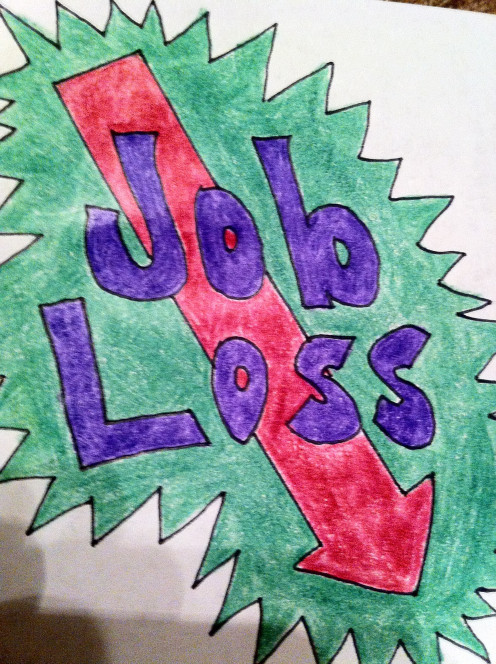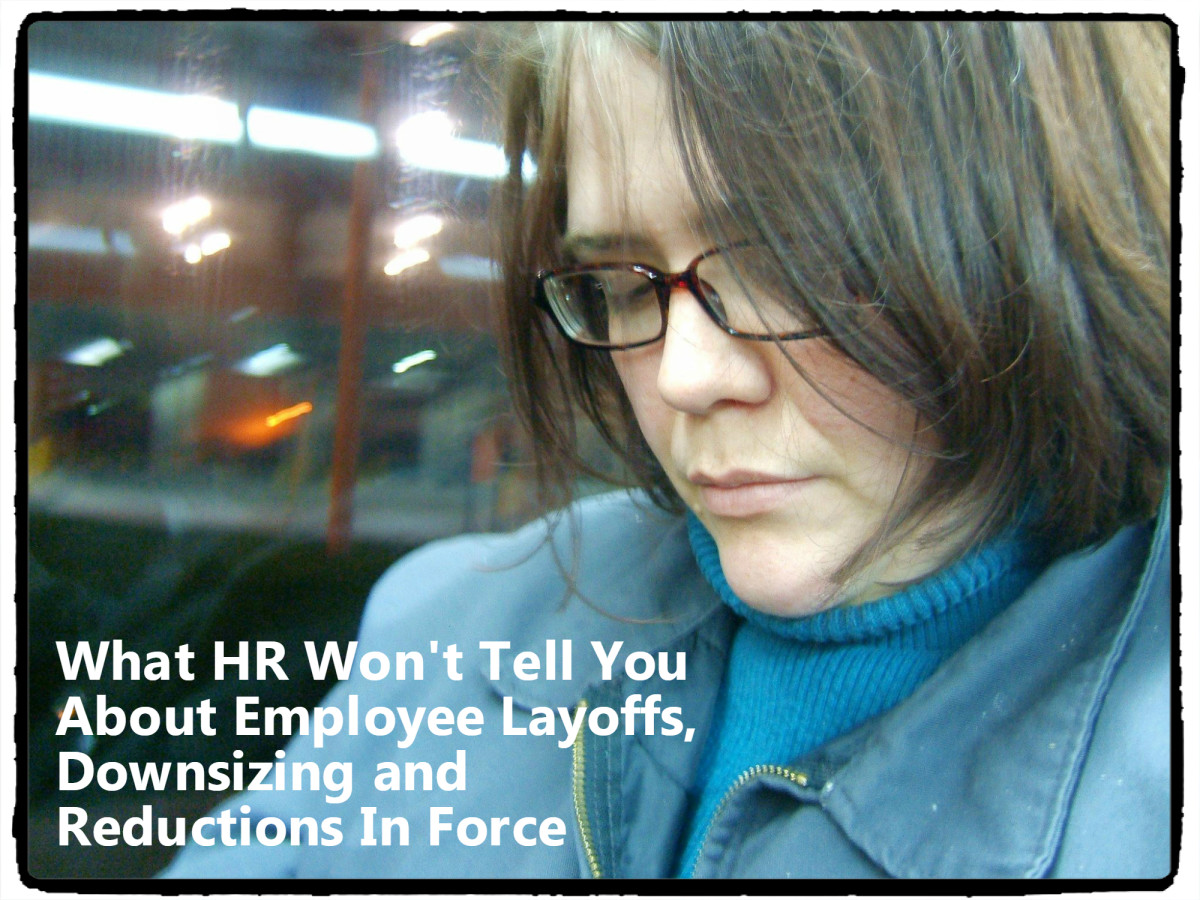- HubPages»
- Business and Employment»
- Employment & Jobs»
- Employment Advice & Tips
Be Prepared: How to Cope with a Possible Job Loss and Find a New Job
While you don’t want to go to work paranoid each day, it’s a good idea to trust your gut if you suspect you may be losing your job. Why not be cautious if you see signs that you will be fired? Being prepared will help you feel confident that you can handle any obstacle that comes your way. If your suspicions come true, learn what to do the day of the firing. This step by step guide on how to handle a job loss includes information about getting the most from your previous employer, unemployment benefits, and how to start your job search. Learn about resumes, interviewing, applications, a job portfolio, and references.

Warning Signs
There are a number of caution signs that could indicate you are losing your job. If you notice more than one of these warnings, you may wish to prepare for the possibility that you may be getting fired or at least familiarize yourself with the issues that surround a job loss and with what is happening in the job market.
Have you seen one or more of these warning signs lately?
- A negative performance evaluation, negative feedback, or an official performance warning from upper management
- Discussion that ends abruptly when you come near. However, remember that people love to “gossip” at work, so take it in caution.
- You are given less work to do or some of your job responsibilities are passed on to others.
- You ask about advancing your career and are told to create a job instruction manual.
- You are asked to train a co-worker or new hire on one of your job responsibilities.
- You cannot take on a new job responsibility, because you do not understand or because it was not explained well.
- An error you made was corrected by someone else, indicating you are incapable of correcting the mistake properly.
There may be other signs you see. Don’t become too distracted by them, but also don’t ignore your gut feelings. Just stay alert if you see warning signs.
Step by Step Instructions If You Suspect a Job Loss:
1. Speak to upper management to see if you can make any improvements in your work performance.
2. Work on your resume, and see what is going on in the job market today.
3. If you find a better opportunity, go ahead and take it, but do not quit your current job until you secure a new one.
4. Make a list of your belongings so you do not forget anything if you get fired.
5. Forward any personal emails from your work computer to your personal email account.

Why Do Most Employers Terminate Employees?
1. Making a costly error, making the company look bad, or causing the company to lose customers
2. Performing an illegal act, violating a policy, stealing from the company, or being unethical
3. Poor performance or an abuse of company’s “time off” policies
4. Disobeying direct orders from management, blatant misconduct, or a disregard for the safety of others
5. Using company resources for personal gain
For Your Friends:
If you worked with people who you built a friendship with, call them that evening with a brief explanation as to why you left. Say positive things; do not bash the company or anyone who still works there.
How to Best Handle the Day You Are Fired:
When you are given the news, ask if you can use the company as a reference. If they will not be a reference, see if they will write you a letter of recommendation for your job portfolio. If you are unsure why you are being fired, you can ask for the reason, but don’t press too hard. You want to stay on good terms. However, if they ask you to sign anything, ask if you can take it home so that you can look it over with a clear ahead or involve a third party. If you have a good relationship with your supervisor, ask if he or she will be a reference for you.
Make sure you leave with all of your belongings. You may wish to take along some notes that you can use to explain the variety of duties you performed. It is much easier to recall the details of your job while you are still at your desk than when you are at home. You will need this information for your resume. Have your list of belongings ready, so you can quickly pack it up, and leave with grace. Don’t make a big scene or run around saying good-bye to everyone. Try to exit quietly.
The key is to maintain a confident attitude. If you feel the need to break down and cry or get angry, it’s best to wait until you get home. Just stay upbeat, speak positively, and try to remain calm. If the company lists your negative attributes while they discuss letting you go, listen and learn for the future. Don’t be combative and argue, but take it in stride, and consider self improvement on those issues.

A Step by Step Guide: How to Handle a Job Loss
Step 1: Request any amount or business documents due to you.
Request severance pay if applicable. If they owe you money for anything like unpaid time off work or tuition assistance, be sure to ask for it. If offered a severance agreement, take it home in order to review it with someone like a lawyer. You can return it the next business day. Make sure the Human Resource department supplies you with a COBRA packet if applicable. This will extend your insurance until you find another job. It is usually a good idea to sign up with COBRA even if it is more expensive.
Step 2: Determine whether the firing was just.
If you signed a contract when you were first employed, you may have a case and may wish to speak to a lawyer about your job loss. You may also have a case against your employer if wrongful termination occurs. Otherwise, your employment should be considered “at will,” meaning the company is free to fire you when they want to. You may be able to figure out whether they had a right to fire you or not by researching the laws of your state. Some states are considered to be “at will” states, meaning employers can fire employees for any reason.
Types of Discrimination:
- Race
- Nationality
- Religion
- Gender
- Age
Wrongful Termination May Occur If:
There is discrimination.
|
You were fired in a way that violates company policy.
|
You were fired for whistle-blowing.
|
You were fired for refusing to do something illegal.
|
What is whistle blowing? Whistle-blowing is the act of exposing a company for an illegal or unethical activity.
Discrimination
If you believe you are a victim of discrimination, check with the United States Department of Labor or with your state’s labor department. Then consult an attorney. If you believe you are a victim of discrimination, you should not sign any documents without the approval of your lawyer. Your lawyer may advise you to sue your former employer if you have just cause.
Age Discrimination
The Age Discrimination Act of 1967 (ADEA) applies to employees 40 years of age or older. It affects decisions regarding hiring, firing, promotion, laying off, compensation, benefits, job assignments, and training. The act permits employers to favor older workers based on age even if it adversely affects a younger worker who is of age 40 or younger.

Step 3: Avoid depression.
If you feel as though you lost your job unfairly and are devastated about what happened, you may suffer from depression. Try to list the pros of getting a new job and the pros of leaving that job. Just think about the future. Concentrate on what your next steps will be when it comes to looking for a job. This will distract you from what happened. It is best to focus on the future and not dwell on the past.
Read the following article on depression to find out more about how to cope with ups and downs that come in life. Do not let a job loss bring you down. Try to find the positives of the situation. If you find yourself exhibiting the symptoms of depression, it is best to seek professional help by means of a counselor or psychiatrist. You can beat depression, and you can get your career back on track. Just have faith and confidence in yourself.
Avoid Depression During a Job Loss
- Learn About Depression: Treating and Overcoming with Self Help
This Hubpage is an overview of Depression along with a detailed list of self-counseling techniques with suggestions and examples. There are many ways you can treat Depression on your own.

Step 4: Should you file for unemployment?
If you were fired for poor performance, cut backs, or a poor job fit, you may be eligible for unemployment. To learn more about eligibility, check your state’s requirements. If you are receiving severance pay, you will not be able to receive unemployment until it runs out. While you are receiving severance pay, which should be approximately what you were previously earning, look for a job. If you do not find a job and your severance pay runs out, go ahead and apply for unemployment. The amount you will receive is based on a percentage of what you were making before and how long you were with the company.
Usually, in order to continue receiving unemployment you will need to do a specific number of job searches. You may even need to go into your local unemployment office to present the searches. You also may need to attend some job training workshops. Keep up with any unemployment requirements in order to continue receiving funds.

Step 5: Search for a new job.
The next morning after you have been fired, wake up at your normal wake up time. Do not deviate from your previous schedule. Get in the shower, and get dressed. When doing your job search, treat it as if it is your job. In other words, “searching for a job” is your job. When you do find one, be sure to notify your previous employer if you are still receiving severance pay, because they will need to cut it off.
Keep answers about gaps in your work history brief, honest, and positive. See if any of these reasons for termination fit.
- New ownership took over the company and began layoffs.
- My position was eliminated.
- The company was going out of business.
Job Search Articles
- Getting a Job: Step-by-Step from Start to Finish Guidance
This guide gives you plenty of job search information, including staying organized, positions and industries, talking on the phone, using email, job fairs, temporary employment, and getting hired. - Find the Perfect Job: How to Write an Ace Resume and Get Hired
The first impression you may make on an employer is often your resume. Therefore, you need to make sure your resume reflects your best work. - Where to Find a Job: Search for Employment and a Career Path
Employment agencies are ideal for looking for a job. They have connections to employers and usually get new job openings. Searching web engines, company websites, and networking are also good tools. - The Job Interview: Job Interview Preparation and What to Ask
This hubpage covers what to do to prepare for your job interview in detail. It also covers questions you should ask or can chose from during the interview. This hub will get you well prepared! - The Job Interview: Job Interview Questions and Questions to Ask
You should be well prepared for interviews. The best way to do this is to have your answers to interview questions ready in advance. Showing your interest can be illustrated by the questions you ask. - Find the Perfect Job: Job Interview Tips and Tricks to Get Hired
Follow these interview tips to land the interview that you are trying to ace! Learn how to have your pick of job offers.
Conclusion
While getting fired can be one of the most devastating experiences of your life, being prepared can ease the stress of the situation. Learn the signs to look for so you will not be caught off guard. This may help you adjust your current job performance if necessary. If you do get fired, your emotions may run hot, but by being prepared, you can leave the company in a professional manner and with a confident attitude.
The step by step job loss guide will help you through the firing, the emotional stress that follows a job loss, and waking up the next day without a job. The key is to know how to find work right away. You may need to file for unemployment if you did not receive a severance package. Understand these topics before you are faced with them so that you are well prepared for anything bad that may happen at work.








